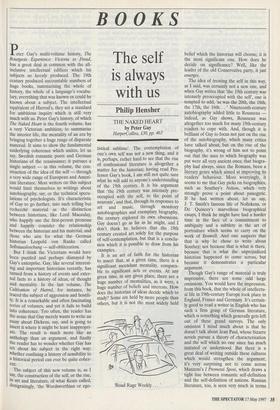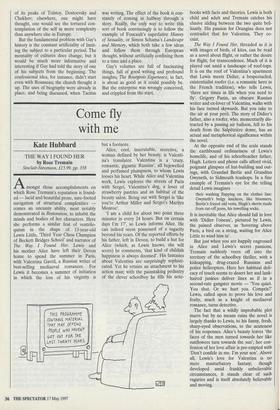BOOKS
The self is always with us
Philip Hensher
THE NAKED HEART by Peter Gay
HarperCollins, £30, pp. 463 titer Gay's multi-volume history, The Bourgeois Experience: Victoria to Freud, has a great deal in common with the all- inclusive intellectual edifices which his subjects so keenly produced. The 19th century produced uncountable numbers of huge books, summarising the whole of history, the whole of a language's vocabu- lary, everything that was known or could be known about a subject. The intellectual equivalent of Harrod's, they set a standard for ambitious inquiry which is still very much with us. Peter Gay's history, of which The Naked Heart is the fourth volume, has a very Victorian ambition; to summarise the interior life, the mentality of an era by bringing together a huge range of disparate material. It aims to show the fundamental underlying coherence which unites, let us say, Swedish romantic poets and German historians of the renaissance; it pursues a single subject — in this volume, the con- struction of the idea of the self — through a very wide range of European and Ameri- can literature. Most writers on this subject would limit themselves to writings about autobiography, say, or the technical specu- lations of psychologists. It's characteristic of Gay to go further, into such telling but recherché material as the distinction between historians, like Lord Macaulay, who happily use the first-person pronoun and happily consider the relationship between the historian and his material, and those who aim for what the German historian Leopold von Ranke called Selbstausloschung — self-obliteration.
But I think the Victorians would have been puzzled and perhaps dismayed by Gay's enterprise. Gay, like several interest- ing and important historians recently, has turned from a history of events and exter- nal facts to a history of ideas, of thought and mentality. In the last volume, The Cultivation of Hatred, for instance, he traced the subject of aggression and hostili- ty. It is a remarkable and often fascinating series of volumes, and yet it fails to build into coherence. Too often, the reader has the sense that Gay merely wants to write an essay about Dickens, say, and is going to Insert it where it might be least inappropri- ate. The result is much more like an anthology than an argument, and finally the reader has to wonder whether Gay has set about his subject in the right way; whether confining a history of sensibility to a historical period can ever be quite coher- ent.
The subject of this new volume is, as I a37, the construction of the self, or the rise, In art and literature, of what Keats called, denigratingly, 'the Wordsworthian or ego- tistical sublime'. The contemplation of one's own self was not a new thing, and it is, perhaps, rather hard to see that the rise of confessional literature is altogether a matter for the historian; having read Pro- fessor Gay's book, I am still not quite sure what he will add to anyone's understanding of the 19th century. It is his argument that 'the 19th century was intensely pre- occupied with the self, to the point of neurosis', and that, through its responses to art and music, through monitory autobiographies and exemplary biography, the century explored its own obsessions. Gay doesn't go as far as he might, and I don't think he believes that the 19th century created art solely for the purpose of self-contemplation, but that is a conclu- sion which it is possible to draw from his examples. It is an act of faith for the historian to assert that, at a given time, there is a significant ascendant mentality, compara- ble to significant acts or events. At any given time, in any given place, there are a huge number of mentalities, as it were, a huge number of beliefs and interests. How does the historian of ideas decide which to study? Some are held by more people than others, but it is not the most widely held Road Rage Weekly ... ' belief which the historian will choose; it is the most significant one. How does he decide on significance? Well, like the leader of the old Conservative party, it just emerges.
The idea of treating the self in this way, as I said, was certainly not a new one, and when Gay writes that 'the 19th century was intensely preoccupied with the self, one is tempted to add, 'as was the 20th, the 18th, the 17th, the 16th. . . ' Nineteenth-century autobiography added little to Rousseau indeed, as Gay shows, Rousseau was altogether too much for many 19th-century readers to cope with. And, though it is brilliant of Gay to focus not just on the rise of the autobiography, which many critics have talked about, but on the rise of the biography, it's wrong of him not to point out that the uses to which biography was put were all very ancient ones; that biogra- phy had always, since the Romans, been a literary genre which aimed at improving its readers' behaviour. More worryingly, it seems to me that Gay picks on biographies, such as Southey's Nelson, which very strongly prove a point about panegyric. If he had written about, let us say, J. T. Smith's famous life of Nollekens, or De Quincey's marvellous biographical essays, I think he might have had a harder time in the face of a commitment to ambiguity and a subtlety in the art of portraiture which seems to carry on the work of Boswell. And one suspects that that is why he chose to write about Southey; not because that is what is there, because that is what the unprejudiced historian happened to come across, but because it demonstrates a particular argument.
Though Gay's range of material is truly impressive, there are some odd large omissions. You would have the impression, from this book, that the whole of intellectu- al life in 19th-century Europe took place in England, France and Germany. It's certain- ly good to read a writer in English who has such a firm grasp of German literature, which is something which generally gets left out of these grand surveys. The only omission I mind much about is that he doesn't talk about Jean Paul, whose bizarre novels pursue a theory of characterisation and the self which no one since has much imitated or understood. But there is a great deal of writing outside these cultures which would strengthen the argument; it's very surprising not to come across Manzoni's I Promessi Sposi, which draws a tight line between romantic self-definition and the self-definition of nations. Russian literature, too, is seen very much in terms of its peaks of Tolstoy, Dostoevsky and Chekhov; elsewhere, one might have thought, one would see the tortured con- templation of the self in more complexity than anywhere else in Europe.
But the fundamental problem with Gay's history is the constant artificiality of limit- ing the subject to a particular period. The mentality of cultures does change, but it would be much more informative and interesting if Gay had told the story of one of his subjects from the beginning. The confessional idea, for instance, didn't start even with Rousseau; the church thought it up. The uses of biography were already in place, and being discussed, when Tacitus was writing. The effect of the book is con- stantly of coming in halfway through a story. Really, the only way to write this sort of book convincingly is to follow the example of Foucault's superlative History of Sexuality, or Simon Schama's Landscape and Memory, which both take a few ideas and follow them through European thought, without artificially confining them to a time and a place.
Gay's volumes are full of fascinating things, full of good writing and profound insights; The Bourgeois Experience, in fact, is about as good as it could possibly be. But the enterprise was wrongly conceived, and crippled from the start.



































































 Previous page
Previous page